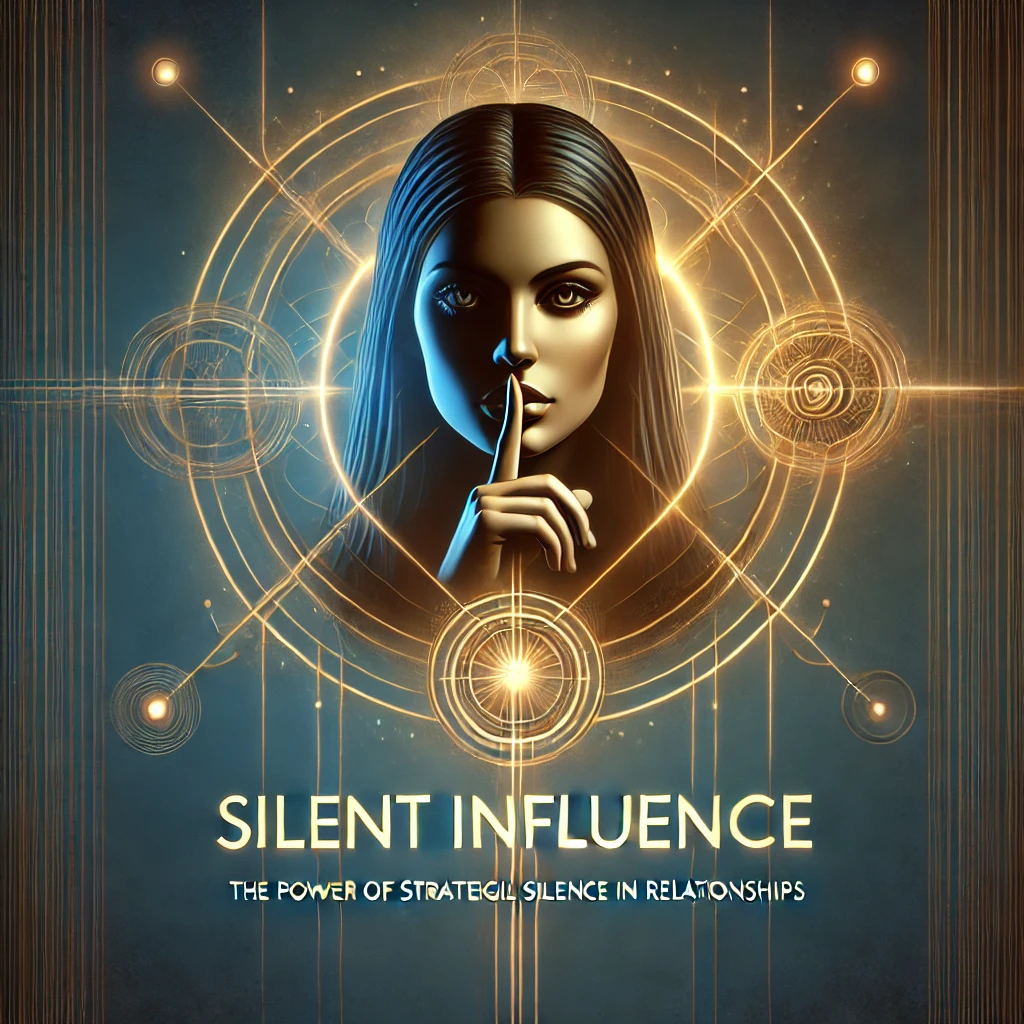When it comes to influencing your partner, most people think of persuasion, communication, and negotiation as the go-to strategies. But what if I told you that sometimes the most powerful influence comes from what you don’t say? Welcome to the world of Silent Influence—a technique where you can achieve what you want by saying less, or even nothing at all. It’s a strategy rooted in patience, emotional intelligence, and the ability to use silence strategically to guide your relationship in the direction you want.
Silence is often underestimated, but it’s a subtle and powerful tool in relationships. It can shift the balance of power, create space for reflection, and allow your partner to come to conclusions on their own—often conclusions that align with your desires. Strategic silence isn’t about withholding communication or playing mind games; it’s about using silence as a tool to create room for influence, allowing your partner to feel more empowered while subtly guiding them toward the outcome you seek.
In this blog, we’ll explore how Silent Influence works, why it’s so effective, and how you can use strategic silence to improve communication, resolve conflicts, and strengthen your bond. We’ll also dive into practical, real-life examples to show you how this technique can be seamlessly integrated into your relationship.
What Is Silent Influence?
Silent Influence is the art of using strategic silence to steer conversations, decisions, and behaviors in a relationship. It’s about knowing when not to speak, when to step back, and how to use pauses to let your partner reflect or even guide themselves toward a certain outcome. Silence, when used strategically, speaks louder than words because it allows space for deeper thinking, emotional processing, and decision-making.
In essence, Silent Influence creates a dynamic where you give your partner the room to act on their own terms, but subtly steer them in the direction you desire. The goal isn’t manipulation—it’s fostering mutual understanding by giving space for reflection and connection.
Why Is Silent Influence So Effective?
Silence creates space. It invites your partner to reflect, think, and consider their actions without the immediate pressure of a conversation. When you step back and allow silence to fill the space, your partner is more likely to think critically about their actions, desires, and decisions. This self-reflection can naturally lead them to adopt behaviors or decisions that align with what you were hoping for in the first place.
It’s effective because:
- Silence builds tension: When there’s a lull in the conversation, people feel the need to fill it, often leading them to reflect on what’s just been said.
- Silence fosters reflection: Giving your partner time to think allows them to process the situation and arrive at their own conclusions, rather than feeling like they’re being pushed or directed.
- Silence can convey confidence: By not immediately responding, you signal that you’re comfortable with the situation and don’t need to over-explain or justify yourself.
Strategic silence is particularly useful when words aren’t moving the conversation forward, or when your partner needs time to process before making a decision.
How to Use Silent Influence in Relationships
Let’s explore how you can use strategic silence in a variety of situations to positively influence your partner’s thoughts, actions, and emotions.
Example 1: Letting Your Partner Come to a Decision on Their Own
You want your partner to commit to something, but they’ve been dragging their feet. Instead of pushing them into making a decision, you can use silence to gently guide them to that conclusion.
How to Use Strategic Silence:
Present your idea or request, and then stop talking. Let the silence settle in. Resist the urge to fill the gap by explaining further or repeating your point. Allow your partner to sit with the silence, process the request, and come to their own conclusion.
Why It Works:
When you stay silent after presenting an idea, your partner is left with space to think. They may start reflecting on your suggestion, considering the pros and cons. Without the pressure of immediate back-and-forth, they’re more likely to take the time to arrive at a decision that aligns with what you’re asking for. The silence gives them ownership of the decision, making them more likely to agree.
Example 2: Navigating Conflict with Calm Silence
During an argument, the natural response is often to keep talking, defending your position, or trying to convince your partner of your point of view. However, when emotions are high, words can escalate things further. Silence, on the other hand, can diffuse the situation.
How to Use Strategic Silence:
When you find yourself in a heated argument, instead of continuing to push your point, pause. Let your partner say what they need to say, and then allow silence to fill the space. Stay calm and collected during this silence, signaling that you’re listening but not engaging in the conflict further.
Why It Works:
Silence in conflict allows emotions to cool. When your partner is met with calm, reflective silence, they’ll have time to process their own thoughts and emotions. Often, they’ll realize that they don’t need to escalate the argument and may even come to a resolution on their own. Silence can be a way to show that you’re giving them space to reflect without fueling the fire.
Example 3: Encouraging Your Partner to Take the Initiative
If you’ve been wanting your partner to take the lead on certain decisions or actions—whether it’s planning a date or taking care of a responsibility—strategic silence can help nudge them in that direction.
How to Use Strategic Silence:
Instead of making suggestions or taking the lead yourself, step back and allow silence to linger after bringing up a topic or task. For example, mention that you’d love to do something fun this weekend, and then stop talking. Don’t offer suggestions or take the reins—just let the silence work.
Why It Works:
The silence gives your partner space to fill the gap by making decisions or taking action. When they’re not being told what to do, they’ll feel more empowered to step up and take the lead. This allows them to feel responsible for the outcome, strengthening their sense of agency in the relationship.
Example 4: Deepening Emotional Conversations
Sometimes, when you’re having an emotional conversation with your partner, there’s a temptation to fill every moment with words. But in emotional discussions, silence can be a powerful tool for creating depth and connection.
How to Use Strategic Silence:
When your partner shares something deeply personal or emotional, don’t rush to respond immediately. Let the silence create space for reflection and deeper conversation. This signals that you’re truly listening and giving them time to process their own emotions.
Why It Works:
In moments of emotional vulnerability, silence can create a sense of safety. Your partner feels heard and validated, and the pause gives them room to express themselves further. Silence shows that you’re present and engaged without needing to fill the space with your own thoughts.
Tips for Mastering Silent Influence
Here are a few key tips for using strategic silence effectively in your relationship:
- Be Comfortable with Silence: It can feel awkward at first, but silence is a powerful tool. Resist the urge to fill every moment with words. Trust that silence creates space for reflection.
- Time Your Silence: Use silence after making a point, asking a question, or during emotional conversations. Give your partner time to think and respond naturally.
- Stay Calm and Composed: Silence only works if you maintain a calm and open demeanor. Your body language and facial expressions should signal patience and confidence, not frustration.
- Avoid Using Silence as Punishment: Silent Influence is about creating space for reflection and connection, not about giving the silent treatment. Make sure your silence is a tool for healthy communication, not a way to shut down or avoid conversation.
Why Silent Influence Can Transform Your Relationship
The beauty of Silent Influence is that it fosters genuine connection and understanding. Instead of overwhelming your partner with requests or emotions, you create space for them to process, reflect, and act in alignment with their own thoughts. This builds trust and respect, while still guiding the relationship toward the outcomes you desire.
Strategic silence is particularly effective in moments of tension or indecision. It shows that you’re confident enough to step back and give your partner room to make decisions without feeling pressured. Over time, this builds a stronger, more balanced relationship where both partners feel empowered and respected.
Q&A:
- What is silent influence, and how can it improve my relationship?
Silent influence involves using strategic silence to guide conversations, decisions, and actions in relationships. It allows your partner space to reflect and come to conclusions on their own, fostering a healthier dynamic by subtly steering the relationship in a positive direction. - How does strategic silence work in a relationship?
Strategic silence gives your partner time to process ideas and decisions without feeling pressured. By staying quiet after a suggestion or during an argument, you allow them to consider their responses naturally, which often leads to outcomes that align with your desires. - Why is silence effective for influencing someone’s behavior?
Silence creates space for reflection and allows a person to make choices without feeling directed. This fosters ownership of decisions, which makes people more likely to act according to their own insights rather than out of pressure, creating a more cooperative relationship dynamic. - Can silence help resolve conflicts in relationships?
Yes, silence can de-escalate conflicts by giving both partners time to cool down and process emotions. Instead of continuing an argument, pausing to let silence settle can help your partner reflect and lead to a calmer, more constructive discussion. - How can I use silent influence to encourage my partner to take initiative?
When you want your partner to take the lead, mention an idea and then let silence fill the space. For example, if you suggest a weekend activity, avoid further suggestions—let your partner fill the gap by planning. This way, they feel empowered to take the lead naturally. - What are some examples of using silence effectively in relationships?
- Decision-making: Present an idea and remain silent to give your partner time to think it over.
- Conflict resolution: Use calm silence to allow cooling off in arguments.
- Encouraging reflection: Use silence after emotional statements to let your partner process before responding.
- How can silence create a deeper emotional connection in a relationship?
During intimate or emotional conversations, silence can be powerful. It signals that you’re listening deeply and providing space for your partner’s thoughts and feelings. This can create a stronger emotional connection as they feel genuinely heard and respected. - What are the main benefits of using strategic silence in relationships?
Strategic silence promotes self-reflection, reduces conflict, strengthens emotional bonds, and allows partners to feel autonomous in their decisions. It shifts the dynamic from directive to collaborative, making for a more balanced relationship. - How is strategic silence different from the silent treatment?
Strategic silence is used purposefully to create space for reflection or decision-making, while the silent treatment is a form of avoidance or punishment. Strategic silence is healthy and constructive, whereas the silent treatment can harm communication and trust. - How can I become comfortable with silence in conversations?
Start by practicing silence after asking questions or making statements. Resist the urge to fill gaps immediately, and instead embrace the quiet as a tool that allows for deeper processing. Over time, you’ll feel more at ease using silence as a powerful influence technique in your relationship.
Want to Master the Art of Subtle Influence in Your Relationship?
If you’re ready to take your influence skills to the next level, “Mastering Him: The Secret Art of Gentle Control in Relationships” is your ultimate guide. In Chapter 5, you’ll dive deeper into Silent Influence and discover 12 other powerful techniques to help you shape your relationship without conflict or pressure.
Get your copy today and start mastering the art of subtle influence. It’s time to take control—not by saying more, but by using the power of silence to your advantage.
Read more about the book: https://developmentpill.com/mastering-him-the-secret-art-of-gentle-control-in-relationships-a-guide-to-influence-hell-never-see-coming/
Book Link: https://www.amazon.com/dp/B0DKKGLZQ9
Book Link UK: https://www.amazon.co.uk/dp/B0DKKGLZQ9
You can find book Links for other regions in this post page: https://developmentpill.com/mastering-him-the-secret-art-of-gentle-control-in-relationships-a-guide-to-influence-hell-never-see-coming/



